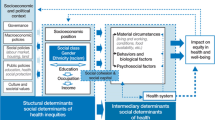Abstract
Linkage arguments, which defend a controversial right by showing that it is indispensable or highly useful to an uncontroversial right, are sometimes used to defend the right to health care (RHC). This article evaluates such arguments when used to defend RHC. Three common errors in using linkage arguments are (1) neglecting levels of implementation, (2) expanding the scope of the supported right beyond its uncontroversial domain, and (3) giving too much credit to the supporting right for outcomes in its area. A familiar linkage argument for RHC focuses on its contributions to the right to life. Among the problems with this argument are that it requires a positive conception of the right to life that is not uncontroversial and that it only justifies the subset of RHC that seeks to prevent loss of life. A linkage argument for RHC with better prospects claims that a well-realized right to health care enhances the realization of a number of uncontroversial rights.
Similar content being viewed by others
Notes
The present article adapts and uses a few passages from these essays.
The appropriate baseline today for the United States is not the absence of the Affordable Care Act. It is rather the absence of all of the government programs (state and federal) that guarantee the availability of heath care to various parts of the population. These include Veterans Administration Hospitals, Workers Compensation, Medicaid, Medicare, COBRA (Consolidated Budget Reconciliation Act), CHIP (Children’s Health Insurance Program), and the Center for Disease Control. Because these programs are in place, I estimate that the U.S. had low-level realization of RHC prior to the passage of Obamacare. If Obamacare succeeds, then the U.S. will achieve at least a medium level of realization.
Shue offered an argument of this sort, although instead of referring to the right to life, he used his closely related basic right to security: “…the basic idea is to have available for consumption what is needed for a decent chance at a reasonably healthy and active life of more or less normal length…”; “a right to subsistence would not mean… that every baby born with a need for open-heart surgery has a right to have it…”; “Deficiencies in the means of subsistence can be just as fatal, incapacitating, or painful as violations of physical security. The resulting damage or death can at least as decisively prevent the enjoyment of any right as can the effects of security violations”; “Any form of malnutrition, or fever due to exposure, that causes severe and irreversible brain damage, for example, can effectively prevent the exercise of any right requiring clear thought…”; “And, obviously, any fatal deficiencies end all possibility of the enjoyment of rights as firmly as an arbitrary execution” [2].
References
World Conference on Human Rights. 1968. Proclamation of Teheran. U.N. Doc. A/CONF. 32/41. http://legal.un.org/avl/pdf/ha/fatchr/Final_Act_of_TehranConf.pdf. Accessed May 10, 2015.
Shue, Henry. 1996. Basic rights. Princeton, NJ: Princeton University Press.
Griffin, James. 2008. On human rights. New York: Oxford University Press.
Nickel, James. 2008. Rethinking indivisibility: Towards a theory of supporting relations between human rights. Human Rights Quarterly 30: 984–1001.
Nickel, James. 2010. Indivisibility and linkage arguments: A reply to Gilabert. Human Rights Quarterly 32(2): 439–446.
Nickel, James. 2013. Goals and rights—working together? In The millennium development goals and human rights: Past, present, and future, ed. Malcolm Langford, Andy Sumner, and Alicia Ely Yamin, 38–48. New York: Cambridge University Press.
U.N. Commission on Economic, Social and Cultural Rights. 2000. The right to the highest attainable standard of health. U.N. Doc. E/C.12/2000/4 (General Comments). http://www.nesri.org/sites/default/files/Right_to_health_Comment_14.pdf. Accessed May 10, 2015.
Hobbes, Thomas. 1660. Leviathan. London: Cambridge University Press.
Kronick, Richard. 2009. Health insurance coverage and mortality revisited. Health Services Research 44(4): 1211–1231.
Nolte, Ellen, and Martin McKee. 2008. Measuring the health of nations: Updating an earlier analysis. Health Affairs 27: 58–71.
U.N. General Assembly. 1990. Convention on the rights of the child. OHCHR. http://www.ohchr.org/EN/ProfessionalInterest/Pages/CRC.aspx. Accessed May 10, 2015.
Jackon, Margot. 2009. Understanding links between adolescent health and educational attainment. Demography 46: 671–694.
Author information
Authors and Affiliations
Corresponding author
Rights and permissions
About this article
Cite this article
Nickel, J.W. Can a right to health care be justified by linkage arguments?. Theor Med Bioeth 37, 293–306 (2016). https://doi.org/10.1007/s11017-016-9369-5
Published:
Issue Date:
DOI: https://doi.org/10.1007/s11017-016-9369-5




